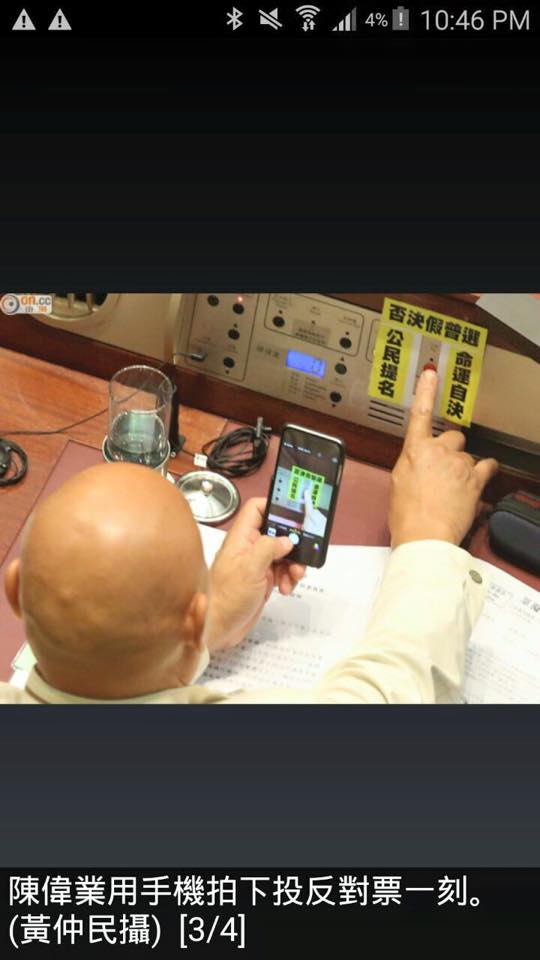The all-important (apparently) vote of the acceptance or not of the newly revamped electoral reform proposals for Hong Kong to vote for the position of Chief Executive (CE) ended in humiliation for Hong Kong’s administration and for Beijing as eight votes for and 28 against was the result – an overwhelming NO out of a legislature comprising 70 members.
Legislative Council rules state that a quorum cannot be less than half of all 70 lawmakers including the president – in other words, 35 lawmakers. Had all of the lawmakers voted, the final count could have recorded 42 “yeas” and 28 “nays” – short of the two-thirds necessary for passage, but a lot more favourable to Beijing as a recorded historical moment.
The government’s political reform package would have allowed Hong Kong citizens to vote for the CE for the first time but required that candidates be vetted by a pro-Beijing committee but 31 pro-Beijing lawmakers left the Legco chamber suddenly just as the vote was about to start. The walkout happened after their request to delay the vote was rejected.
There were tearful radio show interviews in Hong Kong this morning after the vote yesterday as the pro-government, pro-Beijing stance lawmakers were asked to explain themselves.
In general the whole affair is being seen as a fiasco and a miscalculation as the pro-establishment camp tried tactics that were usually in the domain of the pan-democrats but totally lacked their flair and genuine political astuteness – even if the latter group is likely chasing an unrealisable democratic Dream of the Red Chamber.
Now the population, or at least those have political cares, is squarely split into two camps, one supporting the chief executive and his administration, largely the business sector, but also those hoping they are setting themselves up for the future in secure revenue enticing niches, as against those seeking a democratically governed Hong Kong.
There is a widespread lack of trust of Beijing’s intentions for Hong Kong while the current CE, Leung Chun-ying is seen as a favoured fellow traveller and more of a channel to give substance to Beijing’s requirements for Hong Kong rather than a defender of local aspirations.
Besides business leaders, largely from the ranks of The Business and Professionals Alliance, the biggest union is also a supporter of government, as is the most powerful and well organised political party, the Democratic Alliance for the Betterment and Progress of Hong Kong, or DAB – whose former chairman Tam Yiu-chung was inexplicably among those who missed the vote, he was not even near the chamber! Another grouping is the still to-be-reckoned-with Heung Yee Kuk, champion of the indigenous people’s rights with their heavyweight veteran rural kingpin Lau Wong-fat.
The delay was requested by the pro-establishment camp so ‘Uncle Lau’ could vote and one can only wonder why these business types hold the indigenous leader in such awe and esteem – it’s not because he is a super bloke.
The delay plan backfired and the meeting remained quorate as more than half of the lawmakers remained in the chamber, and the legislative council (Legco) president Jasper Tang Yok-sing – who everyone agrees is a ‘super bloke’ went ahead with the vote.
The outcome is that the 2017 Chief Executive will still be elected by the 1200-member committee. This is a standstill result but a win for the pan-democratic camp who steadfastly held their course and consolidated that sector of public opinion agreeing with their efforts in principle, even if that same camp is left unsure of what is best for the future – the answer is suggested along the lines of forget about the politics, let’s get back to making money – but with this squall and the Umbrella Movement as active ingredients, things are not like before.
It is recalled that the territory was wrested from China to serve the commercial interests of the British Empire and even today business figures exert a disproportionate influence over Hong Kong’s politics, including the selection process for the city’s leader. Some will question though who needs who the most! China needs Hong Kong’s glossy image, robust rule-of-law and open markets.
“Beijing does very little for Hong Kong unless it’s in Beijing’s interest,” Michael Davis, a law professor at the University of Hong Kong, is quoted in the media. “Hong Kong has long been much more advantageous to Beijing than the other way around–Hong Kong almost functions like a New York City for China, and so much is done through Hong Kong.”
Thate may be well and true but for legislator Ronny Tong of the Civic Party he rues the day saying, Hong Kong was fortunate that there was no bloodshed during the Occupy protests, but if it happens again, will we be so lucky? Will Beijing be restrained and not interfere? If the government tries to push through this unpopular plan, there will be catastrophic consequences.










